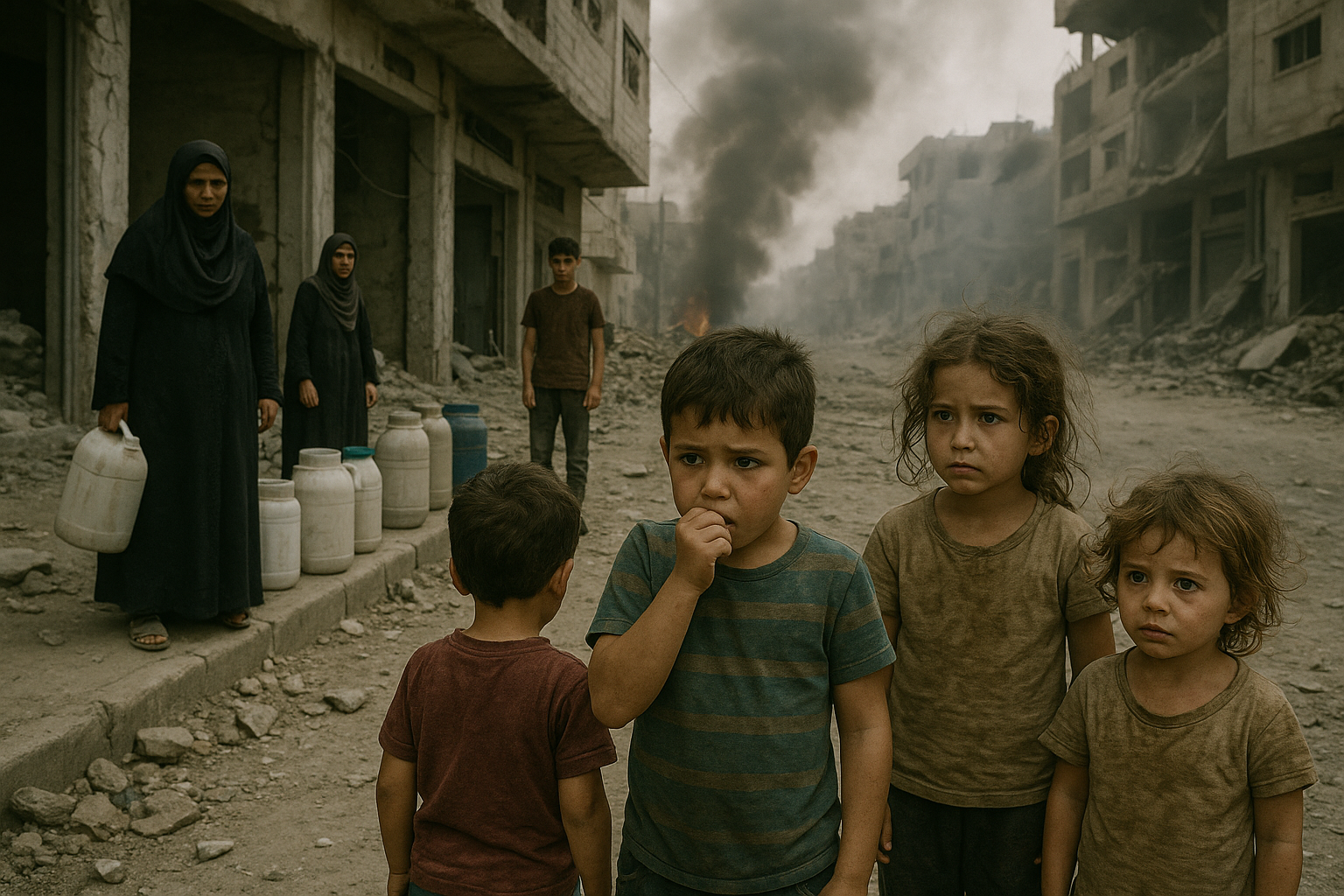Escalating Humanitarian Crisis in Gaza as Israeli Forces Attack Deir El Balah
Following a renewed round of displacement orders by the Israeli military, heavy aerial bombardments and ground incursions have pounded Deir El Balah, an area once considered a relative safe zone.

The latest wave of Israeli military operations targeting southwestern Deir El Balah in the Gaza Strip has unleashed fresh devastation on a population already battered by months of siege, displacement, and deprivation. Thousands of Palestinian civilians, many of whom had previously fled from other parts of Gaza, now find themselves once again forced to evacuate, scrambling to survive amid rubble, uncertainty, and a near-total collapse of essential services.
Following a renewed round of displacement orders by the Israeli military, heavy aerial bombardments and ground incursions have pounded Deir El Balah, an area once considered a relative safe zone. The strikes, according to local sources and international aid agencies, have resulted in widespread destruction of homes, medical facilities, and humanitarian infrastructure. With each new attack, the civilian toll mounts, and the fragility of Gaza’s humanitarian system deepens.
Mass Displacement and Shattered Infrastructure
Deir El Balah had served as a vital hub for displaced Palestinians and humanitarian responders. The area housed clinics, emergency shelters, food kitchens, guesthouses, and warehouses operated by various international and local NGOs. These critical lifelines are now under threat or already destroyed. Entire families have been uprooted once again, joining the hundreds of thousands crammed into ever-smaller enclaves in southern Gaza.
Even these overcrowded areas are not spared from danger. Israel’s continued use of airstrikes, artillery fire, and armored incursions—combined with the densely populated nature of these zones—has made civilian casualties almost inevitable. Aid workers report increasing difficulty in accessing besieged populations, further hampering relief efforts amid growing hunger, disease, and psychological trauma.
Legal and Ethical Alarms Raised
International legal experts and human rights observers have sounded the alarm over potential war crimes and violations of international humanitarian law. The deliberate targeting of civilian infrastructure, compounded by the lack of safe evacuation routes and the denial of essential supplies, raises serious legal questions.
“If civilians are being permanently displaced from areas under occupation, this could amount to unlawful transfer,” said one legal expert, noting that such acts constitute war crimes under the Geneva Conventions. “Depending on the scale and systematic nature, they could also meet the threshold of crimes against humanity.”
The UN and several international bodies have repeatedly reminded Israel of its obligations as the occupying power. These include the duty to ensure the provision of food, medical care, and safe shelter to the civilian population. Israel is also legally bound to allow the unimpeded entry and distribution of humanitarian aid. However, aid convoys and supply routes continue to face delays, denials, or attacks, putting lives at risk.
Calls for Immediate Ceasefire Grow Louder
The intensification of Israeli operations comes amid rising international pressure to halt the violence and prioritize diplomacy. Countries across the Global South, as well as European and Arab nations, are joining calls for a comprehensive ceasefire and a return to serious negotiations.
“The nightmare in Gaza cannot continue to spiral unchecked,” said a statement from a coalition of international humanitarian organizations. “The bombing of shelters, the forced displacement of civilians, and the obstruction of aid flows must end immediately. What we are witnessing is a systemic dismantling of an entire society.”
On the ground, families are running out of options. With infrastructure crippled, food and water scarce, and hospitals overwhelmed or destroyed, the humanitarian space in Gaza is shrinking by the hour. Aid workers warn of looming famine, disease outbreaks, and irreversible psychological harm, particularly among children, who make up nearly half of Gaza’s population.
A Plea for Justice and Humanity
As the crisis deepens, there are urgent calls for accountability. Rights groups are urging international courts and investigative bodies to examine the conduct of hostilities and to collect evidence of potential war crimes. Meanwhile, survivors in Gaza are pleading for immediate international intervention—not just to deliver aid, but to halt the violence at its source.
The humanitarian catastrophe unfolding in Deir El Balah and across Gaza is not the result of natural disaster—it is the outcome of deliberate choices made in the fog of war. Without a dramatic change in course, the cost in human lives and dignity will only continue to climb.
ALSO READ
Trump's Trade Tactics: Ceasefire Claims Between India and Pakistan
Bridging Gaps: The Quest for Gaza Ceasefire
Escalating Violence in Gaza: A Bleak Race Against Time for Ceasefire
Trump and Netanyahu's Quest for Gaza Ceasefire: Diplomatic Dance Continues
White House Talks: Qatar's Diplomatic Role in Gaza Ceasefire










